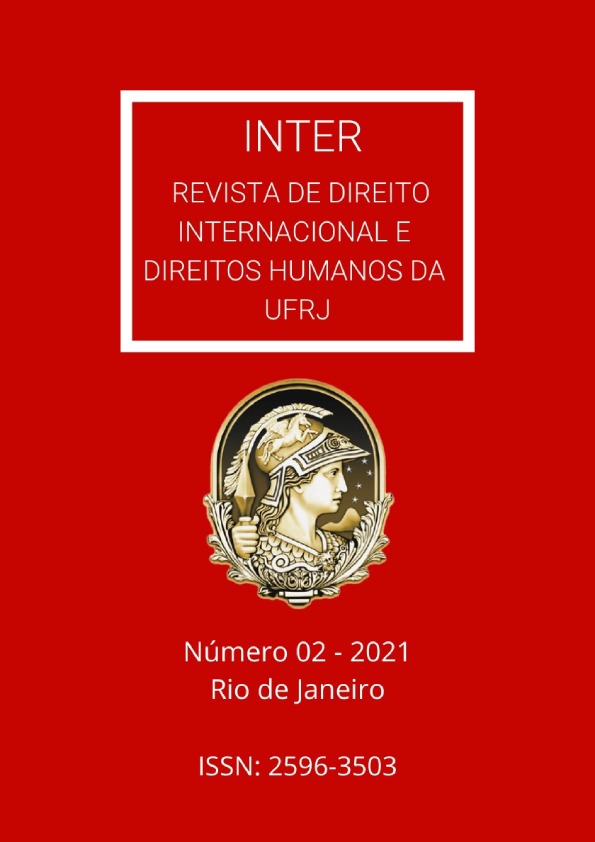THE ORIGIN OF THE MARGIN OF APPRECIATION AND THE JURISPRUDENCE OF THE EUROPEAN SYSTEM OF HUMAN RIGHTS AND INTER-AMERICAN SYSTEM OF HUMAN RIGHTS
Palabras clave:
Judicial review, rule of law, margin of appreciation, european court of human rights, inter-american court of human rights.Resumen
This study seeks to study the margin of appreciation doctrine and its implementation by the European System of Human Rights and Inter-American System of Human Rights. This doctrine originated in the European System and was developed by the European Court jurisprudence. The Inter-American System (such as Inter-American Commission and State Party) used the doctrine based on the European Court of Human Rights jurisprudence. Despite being mentioned by Inter-American Court, the margin of appreciation has not been accepted by it.Descargas
Citas
BIBLIOGRAPHIC REFERENCE
Master Thesis
Guerra, Raquel. Argentina y Brasil frente al Sistema Interamericano de Derechos Humanos: el rol de las organizaciones no gubernamentales en el cambio político doméstico. 2018. Master Thesis (Master’s in international studies) - Department of Political Science and International Studies Torcuato di Tella University, Buenos Aires.
Articles
AJEVSKI, Marjan. Unstable Identities: The European Court of Human Rights and the Margin of Appreciation. PluriCourts Research Paper, 2014, no 14-15.
BENVENISTI, Eyal. Margin of appreciation, consensus, and universal standards. NYUJ Int'l L. & Pol., 1998, vol. 31, p. 843.
CANDIA, Gonzalo. Comparing Diverse Approaches to the Margin of Appreciation: The Case of the European and the Inter-American Court of Human Rights. Available at SSRN 2406705, 2014.
DELGADO, Francisco Roberto Barbosa. El margen nacional de apreciación en el derecho internacional de los derechos humanos: Entre el Estado de derecho y la sociedad democrática. En Diálogo jurisprudencial en derechos humanos entre tribunales constitucionales y cortes internacionales: in memoriam Jorge Carpizo, generador incansable de diálogos--. Tirant lo Blanch, 2013. p. 1089-1118.
FABBRINI, Federico. The margin of appreciation and the principle of subsidiarity: a comparison. A Future for the Margin of Appreciation, 2015.
GERARDS, Janneke. Margin of Appreciation and Incrementalism in the Case Law of the European Court of Human Rights. Human rights law review, 2018, vol. 18, no 3, p. 495-515.
GREER, Steven C. The margin of appreciation: interpretation and discretion under the European Convention on Human Rights. Council of Europe, 2000.
Hutchinson, M. (1999). The Margin of Appreciation Doctrine in the European Court of Human Rights. The International and Comparative Law Quarterly, 48(3), 638-650. Retrieved from http://www.jstor.org/stable/761320
KRATOCHVÍL, Jan. The inflation of the margin of appreciation by the European Court of Human Rights. Netherlands Quarterly of Human Rights, 2011, vol. 29, no 3, p. 324-357.
LEGG, Andrew. The margin of appreciation in international human rights law: deference and proportionality. OUP Oxford, 2012.
LETSAS, George. Two concepts of the margin of appreciation. Oxford Journal of Legal Studies, 2006, vol. 26, no 4, p. 705-732.
PÉREZ, Agustina. Una mirada desde América Latina sobre el margen de apreciación estatal en el Tribunal Europeo de Derechos Humanos:¿ génesis de una permanente tensión entre democracia y derechos. Revista Jurídica de la Universidad de Palermo, 2017, vol. 15, no 1, p. 79-98.
ROJAS, Claudio Nash. La doctrina del margen de apreciación y su nula recepción en la jurisprudencia de la Corte Interamericana de Derechos Humanos. Anuario Colombiano de Derecho Internacional, 2018, vol. 11, p. 71-100.
SHANY, Yuval. Toward a general margin of appreciation doctrine in international law?. European Journal of International Law, 2005, vol. 16, no 5, p. 907-940.
SPIELMANN, Dean. Whither the Margin of Appreciation?’ Current Legal Problems, 2014, vol. 67, p. 49-65.
Jurisprudence
Andrés Aylwin et al. v. Chile, Case 11.803, Inter-American Commission on Human Rights, Report No. 95/98, OEA/Ser.L/V/II.102, doc. 6 rev. (1999).
Case “Relating to Certain Aspects of the Laws on the Use of Languages in Education in Belgium” v. Belgium (Merits), 23 July 1968, Application no. 1474/62, 1677/62, 1691/62, 1769/63, 1994/63, 2126/64, B10.
Case of Dickson v. the United Kingdom (Application no. 44362/04) European Court of Human Rights, 4 December 2007.
Case of Handyside v. The United Kingdom, 7 December 1976, Application No. 5.493/72.
Case of the Sunday Times v. The United Kingdom, 26 April 1979, Application No. 6538/74.
Cases de Wilde, Ooms and Versyp ("Vagrancy") v. Belgium(Merits), 18 June 1971, Application no. 2832/66; 2835/66; 2899/66
Christian B. White & Gary K. Potter v. United States of America, Case 2.141, Inter-American Commission on Human Rights, Report No.23/81, OEA/Ser.L/V/II.85, doc. 9 rev. 1 (1981).
Greece v the United Kingdom, App no 176/56, Report of the European Commission of Human Rights of 26 September 1958
Gretel Artavia Murillo et al. (In Vitro Fertilization) v. Costa Rica, Case 12.361, Inter-American Commission on Human Rights, Report No. 85/10.
I/A Court H.R., Case of Artavia Murillo et al. (In Vitro Fertilization) v. Costa Rica. Preliminary Objections, Merits, Reparations and Costs. Judgment of November 28, 2012. Series C No. 25
Ireland vs the United Kingdom, 18 January 1978, Application No. 5310/71, para. 207
José Ríos-Montt v. Guatemala, Case 10.804, Inter-American Commission on Human Rights, Report No. 30/93, OEA/Ser.L/V.85, doc. 9 rev. (1993), para.24.
International Treaties
American Convention on Human Rights, 1969.
American Declaration of the Rights and Duties of Man, 1948.
European Convention on Human Rights, 1950.

